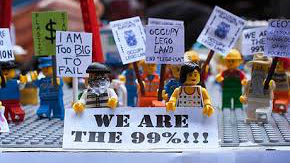Feminism for the Other 99%

Like the rest of the country, feminism has undergone one percent-ification. The most discussed books on women’s lives speak to privileged women while usually assuming, if only by default, to speak about women in the generic.
Sheryl Sandberg’s Lean In isvaluable, for her demographic–well-educated, professionally-oriented women with a lot of choices in life–and she has a vital message to send to them, that perhaps they shouldn’t be opting out on their futures before they even have children, or get married, and they should embrace ambition. But the book should be understood as attuned to her demographic. And, framed by the fact that she’s the CFO of a behemoth corporation of the new economy.
Tiger Mother, another huge bestseller, speaks to the hyper-parenting of this same professional, well-educated, affluent demographic, the one that has the luxury of browbeating and micro-managing their children’s lives to the doorsteps of Yale or Harvard.
Naomi Wolf’s Vagina speaks obliquely to the privileged, or so it was criticized. Who else in their right mind would have the dilatory notion to vagina-gaze like that, oblivious to the non-intra-vaginal universe of women mired in the dismal economic and political crises of the early 21st century? The whole premise was so solipsistic, so Zen pop cultural spa, so… 1%.
Wisdom about “girls” who are leading what an old boyfriend of mine used to call “sad sack” lives, comes via the eponymous HBO drama and its Harvard-educated, deeply-therapized, affluent creator Lena Dunham; Barnard President Debora Spar writes a memoir about wonder women who are trying to do too much at once—pursuing dazzling careers while having children.
The one-percentification of feminism has happened even in porn. You’d think that sex work was the most emancipatory career path, to hear it spoken of, as if everyone is tending to wealthy, suave clients and becoming a porn “star.”
From the vantage point of the top 1% of sex workers, things are coming up roses.
One of the odd moments in Sandberg’s journey up the bestseller list was her surprise and genuine bewilderment that not all women embraced her as a role model.
Ms. Sandberg, one reason might be because you’re the corporate power structure. Most women are not in your shoes. They are under your heel. You’re what the left used to call The Man… or The System…or The Establishment…or The Boss (Wo)man…
An Ur insight of left politics is a thunderous silence in the 21st century: Capitalism and corporations are not sources of liberation. Rather, they create modern forms of oppression and grinding inequality. This is such an elementary premise of left politics that one is embarrassed to have to specify it.
Today, however, class is making a euphemized resurgence. Suddenly, everyone is chattering about “Income Inequality.” I think that means, “class,” perhaps even “class conflict.”
Here are some books—a very small sampling—of feminism for the other 99%:
Where the (Other) “Girls” Are:
Jennifer Silva, Coming Up Short, brilliantly looks at young American adulthood, but in the working classes. She was inspired to write this book because she couldn’t square the narrative about a dithering, choice-laden generation with the lives of poor and struggling Americans. Among other fascinating insights, Silva finds that despite all the structural changes in the economy, young, poor, working-class Americans tend to blame themselves for their own failures. They’ve internalized a pop psychology message that success is all about “attitude” and being positive. Sadly, ideas of collective action, organization, or political activism have no place in this self-critical logic.
Who Cleans Sandberg’s Office?
Barbara Ehrenreich and Arlie Hochschild, Global Woman, is a good starting point. It’s an anthology of jargon-free essays, mostly by sociologists, about the female underbelly of globalization—all of the women who provide domestic and childcare services to the affluent women of wealthy countries, and sexual services to its men. Domestic care happens somewhere in this world, by someone, in private spaces, even as the bestseller list is dominated by well-lit views from the corner office.
It’s also worthwhile to revisit Ehrenreich’s Nickel and Dimed, her “undercover” journey through largely female service sector jobs.
When Eliot Spitzer Isn’t Your Client, and You’re not the Mayflower Madam:
Gail Dines, Pornland, is an oddly brave feminist work—brave in that it ventures to argue a position that would have sounded like feminist common sense 40 years ago: Porn is an economy in which sexual entrepreneurs exploit women for someone else’s profit, and the product has gotten more extreme and misogynistic over time. This trajectory obviously doesn’t describe all porn, but a troubling percentage of it. Simple, right? With wit and energy, she strips away the feminist and non-feminist romantic fantasies that attach to sex work. She reveals it to be no better than, and in many respects worse than, all of the other intrusive, badly-paid, dead-end, and degrading jobs that women, and men, too often pursue to stay alive.
Over 27 million humans today are trafficked and laboring in a state of near-slavery. Some of these humans are victims of sex trafficking. British author Sophie Hayes’ memoir, Trafficked, of her coercion into prostitution at the hands of a debt-ridden, long-time boyfriend, will make you rethink the complexities of consent, and the notion that sex trafficking is just an uptight, bourgeois invention, or bogeyman.
Memoirs by women born with a plastic spoon in their mouths:
Welfare Brat, Mary Childers’ memoir of growing up on welfare in the Bronx is brilliant in its rendition of the psychological tensions between family loyalty and class mobility, as the author realizes early in life that education is her way free of the grip of poverty. She experiences what Richard Sennett called the “hidden injuries of class,” in her sense of loathing and self-loathing for her own impoverished upbringing, but also attachment to a heroic mother who occasionally triumphed over grim odds.
Adrian LeBlanc’s Random Family is flat-out one of the most meticulously researched, keenly observed, exquisitely-narrated studies of poverty, women, and the drug culture—anchored by one New York family and its romances (West Side story this is not). Based on a decade of immersion research, LeBlanc’s book elegantly puts paid to the most vicious clichés of “welfare to work” and welfare reform, while simultaneously telling a gripping story.
With or Without You is Domenica Ruta’s memoir of a boom and bust childhood with an erratic, drug-addicted mother who has high hopes for her daughter and who occasionally strikes it big financially, but can’t translate those aspirations or resources into a stable, consistent home. Of particular interest here is the author’s toggling between the chaos of her life with her mother and her visits to the world of her father’s placid, suburban home.
What about the Men?
Susan Faludi’s Stiffed is still a valuable compilation of men’s declining, limp fortunes, and their origins in structural changes in economy that have betrayed women as well as men. It strikes a less 1% tone than Hannah Rosin’s more recent work, The End of Men. It would come as news to American women living in socially conservative, fundamentalist, patriarchal sub-cultures where women are advised to “voluntarily submit” to husbands; where female extramarital sexuality is treated as dirty and polluted; where virginity is fetishized and sexual violence all but ignored when not blamed on the victim, that we have reached the end of men. In much of the country neo-patriarchy is alive and kicking, even as men’s economic and educational wherewithal decline.





